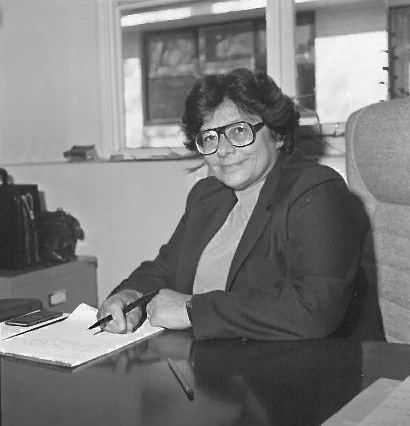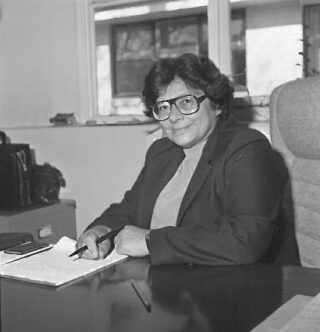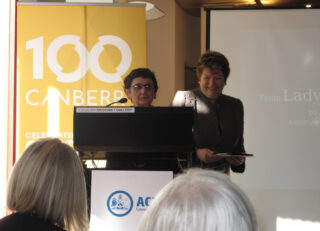- Entry type: Person
- Entry ID: AWE4895
Shea, Agnes Josephine
- Bulger, Agnes
Aunty Agnes Shea
Walker, Agnes

- Born 4 September 1931, Oakhill, North Yass, New South Wales
- Died 11 March 2023
- Occupation Aboriginal Elder, Aboriginal rights activist
Summary
Aunty Agnes Shea is a highly respected elder of the Ngunnawal Aboriginal people of the Australian Capital Territory (ACT). A foundation member of the United Ngunnawal Elders’ Council and a member of the ACT Heritage Council, Aunty Agnes works toward improving non-Indigenous Australians’ understanding of Aboriginal culture. She contributes significantly to progress towards reconciliation. (Reconciliation is about unity and respect between Aboriginal and Torres Strait Islanders and non-Indigenous Australians. It is about respect for Aboriginal and Torres Strait Islander heritage and valuing justice and equity for all Australians.) Her work in the area of health and social equity for Aboriginal people contributes to an increase in the quality of life for many. Aunty Agnes is one of the Ngunnawal elders who performs the traditional Ngunnawal Welcome to Country ceremony for visitors to the ACT.
Details
Aunty Agnes Shea (née Bulger) was born at Oak Hill, North Yass, New South Wales (NSW) in 1931, the fifth of eight children of Violet Josephine Bulger (née Freeman), domestic servant and Edward Walter ‘Vincent’ Bulger, railway worker.
Aunty Agnes grew up at Oak Hill and the Hollywood Aboriginal Reserve, near Yass, NSW. (Hollywood Aboriginal Reserve is often referred to as the Hollywood Mission.) She portrays a strong sense of community when talking about those years:
It was a different life to now, we had much more closeness and togetherness and we lived with our uncles and aunties, grandparents and friends and we cared and shared with each other. We felt protected because our Elders were there with us (AIATSIS NTRU Conference 2010).
Aunty Agnes describes Oak Hill as an ‘open bit of ground on the stock route’ (Brown, 2007, p. 79) where Aboriginal people were permitted to build and live in gunjes, dwellings with dirt floors, stringy-bark walls and galvanised iron roofs. They had no electricity or running water, only an open fire for heating and cooking. For warmth, people lined the gunjes with layers of newspaper and corn bags from the nearby mill.
Aunty Agnes attended school from the age of 7. This meant walking 10 kilometres each way from Oak Hill to the Hollywood Aboriginal Reserve school, until 1938 when they were all moved to the Reserve where housing was a little better with galvanised iron walls, wooden floors, separate bedrooms and cement water tanks. The Aboriginal children were permitted access to limited parts of town and only under supervision. They were forbidden to speak their own language when in town; and threatened with court and removal to a children’s home if they did. Aunty Agnes said that practices and policies changed very slowly for the Aborigines and that ‘Hollywood was a place that you survived. But we had happy times there.’ (Brown, 2007, p. 90).
On Christmas Eve 1939 when Aunty Agnes was eight years old her father Vincent died suddenly, leaving his widow with eight children. Violet Bulger was given permission to do domestic work in town, but eventually the family was forced to leave the Reserve. Aunty Agnes remembers:
The authorities came and told her she had to be moved off the Mission, because she was now a single mother and she was a bad influence on the rest of the community. (Brown, 2007, p. 86.) (This was clearly the family understanding. To date research has not found a record of any such official policy but unofficial local policies were not unknown on Aboriginal Reserves.)
Aunty Agnes tells how they then lived at ‘a place called Morton Avenue’, about five kilometres from Yass. She and her siblings walked the five kilometres to school because Aborigines were not permitted to use the school bus service. She explained the limited schooling opportunities for Aborigines during those days: ‘you had to leave when you were fourteen … to make room for the other ones coming up behind you. I – and many others in my age group – only had education from first class to third class. … But we did have the cultural education which came from our family; our Elders and grandparents.’ (Brown, 2007, p. 83).
In 1947 at Yass, Aunty Agnes married Ronald Joseph ‘Ron’ Walker, taking his surname until she married again after his death. Walker was a professional boxer who also worked on the Burrinjuck Dam. They stayed on at Morton Avenue where their children were born. When her mother, Violet Bulger, moved to Tumut, Aunty Agnes took on her domestic jobs in town.
Aunty Agnes’ first baby, Mary, was born in 1949. Aunty Agnes was one of first three Aboriginal women allowed to have babies in Yass Hospital although they were confined to a back ward and could only use the rear entrance to the hospital. She tells how a yellow line painted across the corridor marked the boundary of where the Aboriginal women were permitted to walk. They could walk to the yellow line and no further; they were forbidden from associating with the non-Indigenous new mothers in the adjacent ward.
In 1952 Ron Walker burnt to death working in a shearing shed on Sir Walter Berryman’s property on Dog Track Road, Yass leaving Aunty Agnes a widow with three young children. Aunty Agnes’ second husband Charles Shea was a non-Indigenous person from Yass with a contracting business. Aunty Agnes said this meant she no longer had ‘to worry about the income coming in’ although she did continue doing domestic work. She had four children with Charles Shea.
Aunty Agnes is Ngunnawal although her parents were Wiradjuri. She describes how in Aboriginal culture bloodlines follow the female side of the family and that she follows her paternal grandmother, Grace Bulger (née Lewis) while her brother, Vincent Bulger OAM, follows their mother Violet Bulger (née Freeman) who was Wiradjuri.
Aunty Agnes’ significant community involvement is indicative of her commitment to helping young people and fostering respect between the many cultures of people in the Canberra region. She is a member of the Advisory Board to ACT Health and a foundation member of the United Ngunnawal Elders Council (UNEC). Through her UNEC work Aunty Agnes is involved in the initiative to establish the Ngunnawal Bush Healing Farm (NBHF), an Aboriginal and Torres Strait Islander alcohol and other drug residential rehabilitation service implementing culturally appropriate prevention and education programs. She is a member of Journey of Healing ACT, an organisation that supports local Indigenous communities who live with the effects of earlier Australian policies that separated Indigenous children from their families and communities and works for healing between Indigenous and non-Indigenous people.
Further testimony to the esteem in which Aunty Agnes is held occurred in 2008; she was invited to officially greet the Olympic flame when it visited Canberra in preparation for the Beijing Olympics. Her words expressed the longevity of Aboriginal history in Australia and hope for the future:
I welcome the Olympic torch to Australia in the spirit of peace on behalf of my people, whose history in this place goes back to the beginning of time. May its stay here be one that symbolises good will for all mankind (USA Today, 2008)
In her role as a Ngunnawal elder, Aunty Agnes frequently represents the local indigenous people – the Ngunnawal – in Welcome to Country ceremonies at official ACT and Commonwealth government events. In accord with traditions dating back thousands of years, on behalf of her people she welcomes visitors to Ngunnawal traditional land and offers safe passage. Aunty Agnes always finishes the welcome in the language of her people with the inclusive statement, ‘Ngunna Yarabi-Yengue’ which translates as ‘you are welcome to leave your footprints on our land.’
Aunty Agnes says each of her children had a good education, which enabled them to go into good employment. She has 14 grandchildren and 3 great-grandchildren and lives in Canberra where she continues her extensive community work championing social equity for Aboriginal and Torres Strait Islander people and reconciliation between cultures.
Digital resources
Published resources
-
Site Exhibition
- From Lady Denman to Katy Gallagher: A Century of Women's Contributions to Canberra, Australian Women's Archives Project, 2013, http://www.womenaustralia.info/exhib/ldkg
-
Resource Section
- Meet Some Elders - Agnes (Bulger) Shea OAM, 2010, http://www.aiatsis.gov.au/ntru/nativetitleconference/conf2010/culturalprogram.html
- ACT Honour Walk plaque: Agnes Shea OAM, http://www.flickr.com/photos/archivesact/5227584146/lightbox/
- Reconciliation, 2009, http://australia.gov.au/about-australia/australian-story/reconciliation
-
Newspaper Article
- Aussie tribeswoman greets Olympic flame, 2008, http://www.usatoday.com/news/world/2008-04-22-torch-australia_N.htm
-
Resource
- Trove: Shea, Agnes Josephine (19310904-), http://nla.gov.au/nla.party-1665896

